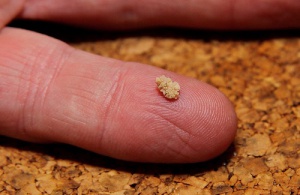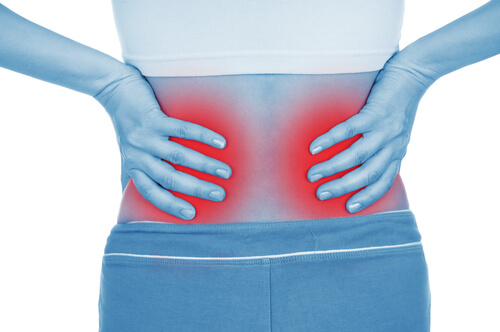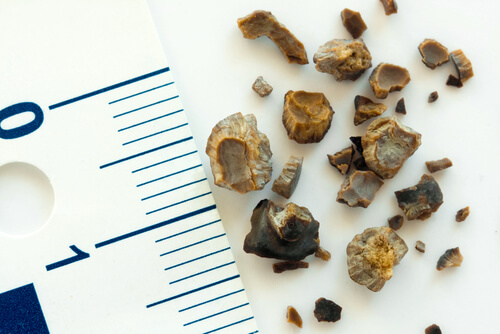What Are The Causes of Kidney Stones?

Renal calculi, kidney stones, or nephrolithiasis refer to a hard mass formed by crystals present in urine. Natural compounds and chemicals present in urine can often prevent their formation. There are many causes of kidney stones and today we’ll be looking at many of them.
It’s a good idea to know the causes of kidney stones, as well as their symptoms, effects, and possible treatments for eliminating them. Also, if you don’t treat them in time, they could cause irreversible damage and possible recurrence.
Incidentally, there are different types of calculi. That’s why you’ll need an analysis on them in order to be able to eradicate them and to build a healthy life so they don’t come back.
Causes of kidney stones
Around 5% of women and 10% of men suffer from kidney stones over the course of their life, in the United States. This painful illness represents a loss of $2 billion a year, and it happens when urine contains an amount of specific substances in it. Small crystals then form, which turn into calculi. It can takes weeks or months to acquire consistency and to form.
People that don’t drink enough liquids also have a higher risks of suffering from them. However, they are more likely to develop if you produce less than one liter of urine a day, which is equivalent to roughly one quarter gallon.
Kidney stones can be eliminated from the body, however, without causing permanent effects. They are painful and have the ability to come back if you don’t find and establish treatment. If a long time goes by between the formation of the stones and treatment, it could cause consequences in the kidney, along with other adverse effects.
Doctor Glenn Preminger, director of the Comprehensive Kidney Stone Center at Duke, and professor of Urology Surgery at the University of Duke, stated that: “There is no doubt that kidney stones are related to obesity”. The doctor also participated as co-author in the Journal of Urology for similar findings in a study.
Symptoms
It is quite common for kidney stones not to show any symptoms during their formation. They can even move down the ducts called ureters, which are then transported to the bladder by the urine. That’s how, when they show up, the stones could block and threaten the passage of urine from the kidneys.
This illness can bring a lot of diverse symptoms. The primary is intestinal pain that begins sporadically and suddenly, and ends just the same way. So there are two types of pain that one can experience. The first is on one side of the back or in the abdominal region. The second type of pain could possibly extend to the testicles (testicular pain) or to the groin (groin pain).
Other symptoms could be:
- Vomiting
- Blood in urine
- Nausea
- Abnormal urine color
- Chills
- Fever
Effects
This condition could cause possible complications that, if left untreated, could cause more severe complications because of how the calculi block urine flow.
Possible complications:
- Urinary tract infection
- Acute unilateral obstructive uropathy and ureter whitening.
- Kidney damage and healing problems.
- Stone recurrence.
- Loss or decrease of function in the damaged kidney.
The different types of kidney stones
You should keep in mind that there are different causes of kidney stones and types of stones.
- Cystine kidney stones: these could form in people with cystinuria disorder, which is hereditary and both men and women can suffer from it.
- Calcium kidney stones: these are the most common and men between the ages of 20 and 30 are more likely to suffer from them. They form when calcium is combined with different substances like phosphate, carbonate or oxalate. This last substance is found in several foods like spinach or vitamin C supplements. Also, other small intestine illnesses increase the appearance of kidney stones.
- Uric acid stones: these are more common in men than in women and can happen with chemotherapy or gout.
- Struvite stones: these reside in women that have urinary tract infections, and they can grow to a size capable of cutting off the bladder, the kidney, and the ureters.
Other substances can also form kidney stones, like medications such as indinavir, aciclovir, and triamterene.
Treatment
Kidney stone treatment should begin with a special diet. After the doctor confirms which type of stones you have and does different tests to determine this, you could begin a more specific diet, necessary for diminishing and removing them. A nutritionist or dietitian can give you the new diet, even though it’s likely that in any diet they would change the amount of potassium, salt, liquid, protein, oxalate and calcium that you consume.
One way of avoiding them and dissolving them is to drink between 6 and 8 glasses of water a day. The pain, however, could be quite extreme, potentially requiring narcotic analgesics. Also, if this pain is unbearable, the individual can be hospitalized with intravenous fluids.
Along with this, specific treatment depends on the type of stone formed, and the symptoms produced. If they are small, the stones tend to leave on their own and, if they leave the body, you must save the urine so as to analyze the stone and prevent future problems.
Medication
Depending on the type of stone, there are a few medications that the doctor can give you to prevent their formation, or to stimulate their decomposition by eliminating the material causing them. Some of the following medications are a few possibilities:
- Diuretics (Thiazide diuretics)
- Antibiotics effective on struvite stones
- Sodium citrate and sodium bicarbonate.
- Allopurinol for treating uric acid stones.
- Phosphate solutions
If surgery is necessary, the stones must have the following characteristics:
- They must be big enough to come out on their own.
- The stone must be causing a barrier for urine flow while at the same time causing kidney pain or infections.
- They must be continuously growing.
- The pain they cause are extreme and unbearable
Types of surgery
A lot of stones don’t produce any complications, or their complications are not serious.
- Percutaneous nephrolithotomy: used with very large stones that are close to the kidney, or in it. If this happens, the stone is removed by a probe called a endoscope, which enters the kidney through a small surgical incision.
- Ureteroscopy: could be administered if stones are in the lower urinary tracts.
- Extracorporeal lithotripsy: which uses shock waves to eliminate stones that are smaller than half an inch. They must be in the ureter or near the kidney in order to use this method. By using shock waves or sound waves, the stones are broken up, which can then be eliminated by the urine.
- Additionally, open surgery or nephrolithotomy could be necessary in come cases. However, this is only carried out if other methods cannot be used.
Advice for preventing kidney stones
If you keep in mind this specific advice, like a simple change in diet, you could prevent kidney stones. Also, if you already suffer from them, you must take precautions to avoid future complications or recurrences.
- The causes of kidney stones could be hereditary. Also, if you have had them previously, drinking a lot of liquids is recommended. As previously mentioned, between 6 to 8 glasses of water a day are necessary for the body to produce enough urine.
- In regards to the liquids you should try to consume, don’t forget that some liquids have the ability to dehydrate you even more quickly. That’s why people avoid drinking them. Examples of these are beverages that contain caffeine or alcohol.
- You must always keep in mind what type of stone is present, in order to take the prescribed medications. There are some that, when taken, have the ability to diminish certain compounds produced by kidney stones in the urine, or to reduce the likelihood that they form in the urine.
See more: Kidney Stones: Lemon, Olive Oil, and Apple Cider Vinegar Remedies
Dietary causes
- The causes of kidney stones could be dietary. You could make certain dietary changes to avoid consuming foods that cause kidney stones and that could cause recurrences if you have already had them. That’s why it is recommended that you stop eating dairy products like cheese and milk.
- If you have oxalate stones, you must stop drinking sodas, and eating peanuts and chocolate.
- If you have cystine stones, you should reduce your fish consumption.
- For people that suffer from uric acid stones, eating red meat, anchovies, and chicken is not a good idea.
All cited sources were thoroughly reviewed by our team to ensure their quality, reliability, currency, and validity. The bibliography of this article was considered reliable and of academic or scientific accuracy.
- Edvardsson, V. O., Goldfarb, D. S., Lieske, J. C., Beara-Lasic, L., Anglani, F., Milliner, D. S., & Palsson, R. (2013). Hereditary causes of kidney stones and chronic kidney disease. Pediatric Nephrology. https://doi.org/10.1007/s00467-012-2329-z
-
Frassetto, L., & Kohlstadt, I. (2011). Treatment and prevention of kidney stones: An Update. American Family Physician. https://doi.org/d10124 [pii]
This text is provided for informational purposes only and does not replace consultation with a professional. If in doubt, consult your specialist.










